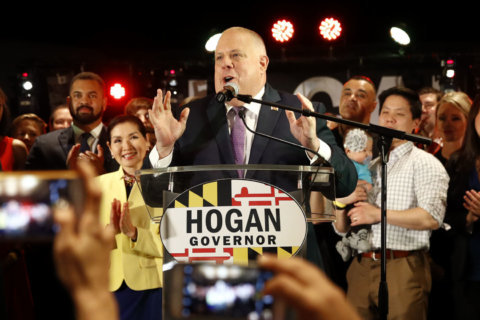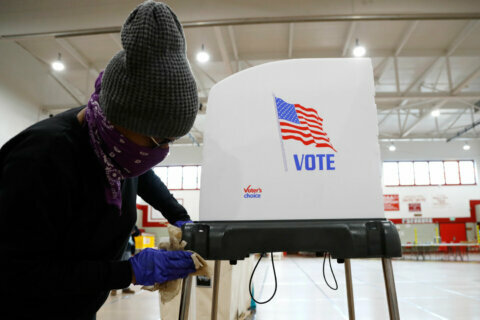WASHINGTON — Republican Gov. Larry Hogan won a historic re-election in Maryland, crushing Democratic challenger Ben Jealous in a state where Democrats far outnumber Republicans.
But, Hogan’s decisive victory largely failed to translate into down-ballot success for the GOP in Maryland.
Republicans failed to pick up enough seats in the Maryland state Senate to snatch away Democrats’ veto-proof majority. Democrats, however, managed to pick up a handful of seats in the House of Delegates and toppled Republican officeholders in two upset county executive victories.
“Larry Hogan had a smashing victory … Ultimately, however, it was really a personal rather than a partisan victory,” said David Lublin, a professor in the School of Public Affairs at American University.
Nationwide, Democrats rode a wave of enthusiasm and turnout — or, at least, a strong ripple — to retake control of the U.S. House. Though Hogan remained on top and the makeup of Maryland’s congressional delegate remained unchanged after Tuesday, Democratic enthusiasm came out further down the ballot.
“Democrats were comfortable voting for Larry Hogan but everywhere else on the ballot, they really wanted to lodge their anger with President Trump, their frustration with the national Republican party,” said Todd Eberly, an associate professor of political science at St. Mary’s College of Maryland.
“They voted Hogan and then they voted Democrat everywhere else, and that swept out a lot of folks who otherwise looked like they might have been safe,” Eberly said.
Hogan’s smashing victory
Hogan made history with his big win, becoming the first Republican governor to be re-elected in more than 60 years and only the state’s second GOP governor to be given a second term by voters.
Hogan won nearly 1.2 million votes in the contest, besting Democratic candidate Ben Jealous. Overall, turnout was up 20 percent compared to four years ago, according to an analysis by Eberly.
The problem for Jealous was that so many Democrats defected from their party’s nominee, Lublin said.
Though the governor’s victory was propelled by massive margins in western Maryland and along the Eastern Shore (where he received more than 70 percent of the vote in many counties), Hogan also made notable gains in Democratic strongholds.
“Indeed, his largest gains of any county in the state was in Prince George’s County, where he was up 13 percent,” Lublin said. “He gained nearly one-third of the vote in Baltimore City, which was supposed to be Jealous’ base.”
‘Drive for 5’ runs out of gas
But even with Hogan surging, Republicans’ efforts to chip away at Democrats’ supermajority in the state Senate fizzled.
Going into Election Day, Democrats held 33 of the 47 seats in the chamber. Under the “Drive for Five” effort, Republican leaders in the state had aimed to topple at least that many seats in the Senate, giving the GOP enough seats to stop Democratic vetoes.
But, on Tuesday, the “Drive for Five” ran out of gas.
Overall, Republicans managed to flip two Democratic-held seats but also appeared to be heading for an unexpected loss of one of their own seats. That leaves Republicans with a likely net gain of just one additional seat in the chamber.
“The ‘Drive for 5’ became the ‘settle for one’ plan,” Lublin said.
In District 38 on Maryland’s Eastern Shore, Republican Mary Beth Carozza defeated Democratic incumbent Jim Mathias, who was the only Democratic state senator to be unseated.
The GOP also picked up the Democratic-held open seat in District 42 in Baltimore County, with Republican Del. Chris West defeating Democratic contender Robbie Leonard.
However, in all the other seats Republicans targeted for potential flips, Democrats fended off challengers. And, in the race for District 9 in Howard County, Democrat Katie Hester was leading Republican Gail Bates by 154 votes in a nail-biter of a race that had yet to be called Wednesday.
Dems pick up delegate seats
In Maryland’s House of Delegates races, Democrats did even better, defeating four incumbent Republican delegates, picking up an open seat and leading in two other races that had not yet been called.
The Democratic victories came in:
- District 3B in Frederick County, where Democrat Ken Kerr knocked off Republican Del. William Folden;
- District 8 in Baltimore County, where Democrat Harry Bhandari upset Republican Del. Joseph Boteler for one of two seats;
- District 9B in Howard County, where Democrat Courtney Watson defeated Del. Robert L. Flanagan;
- District 29B in St. Mary’s County, where Democrat Brian Crosby defeated Del. Deb Rey; and,
- District 30A in Anne Arundel County, where Democrat Alice Cain picked up an open seat.
All told, depending on the outcome of the few races that have yet to be called, Democrats are looking at holding 99 of the 141 seats in the House of Delegates.
County executive races: 2 Democratic upsets
Democrats carried off upsets even further down the ballot.
In Howard County, typically regarded as a swing district, County Executive Allan Kittleman, a Republican, failed in his bid for re-election to Calvin Ball, who is set to become the county’s first African-American county executive.
Ball, a Howard County council member, defeated Kittleman by more than 6,000 votes, 52 percent to 47 percent.
In Anne Arundel County, Democrat Steuart Pittman pulled off an upset victory over Republican incumbent Steve Schuh, 51 percent to 48 percent.
Both Democratic wins were unexpected, but the Anne Arundel County race was particularly surprising, Eberly said.
“I think as recently as a week ago, Schuh did not think he was really in much danger at all,” he said.
What does it mean for Maryland?
Hogan now faces a more emboldened and, in many cases, more liberal General Assembly, Lublin said.
So, what does that mean for how Hogan governs over the next four years?
In a public address in Annapolis Wednesday, Hogan pledged to continue running Maryland as a moderate problem-solver, focusing on issues such as transportation and education.
“Voters sent a strong message that that’s what they want … They returned him strongly, but they also returned the Democrats even more strongly in the legislature and so, I think, that’s what voters want him to do and, frankly, given the composition of the legislature, that’s what he’s going to have to do,” Lublin said.








